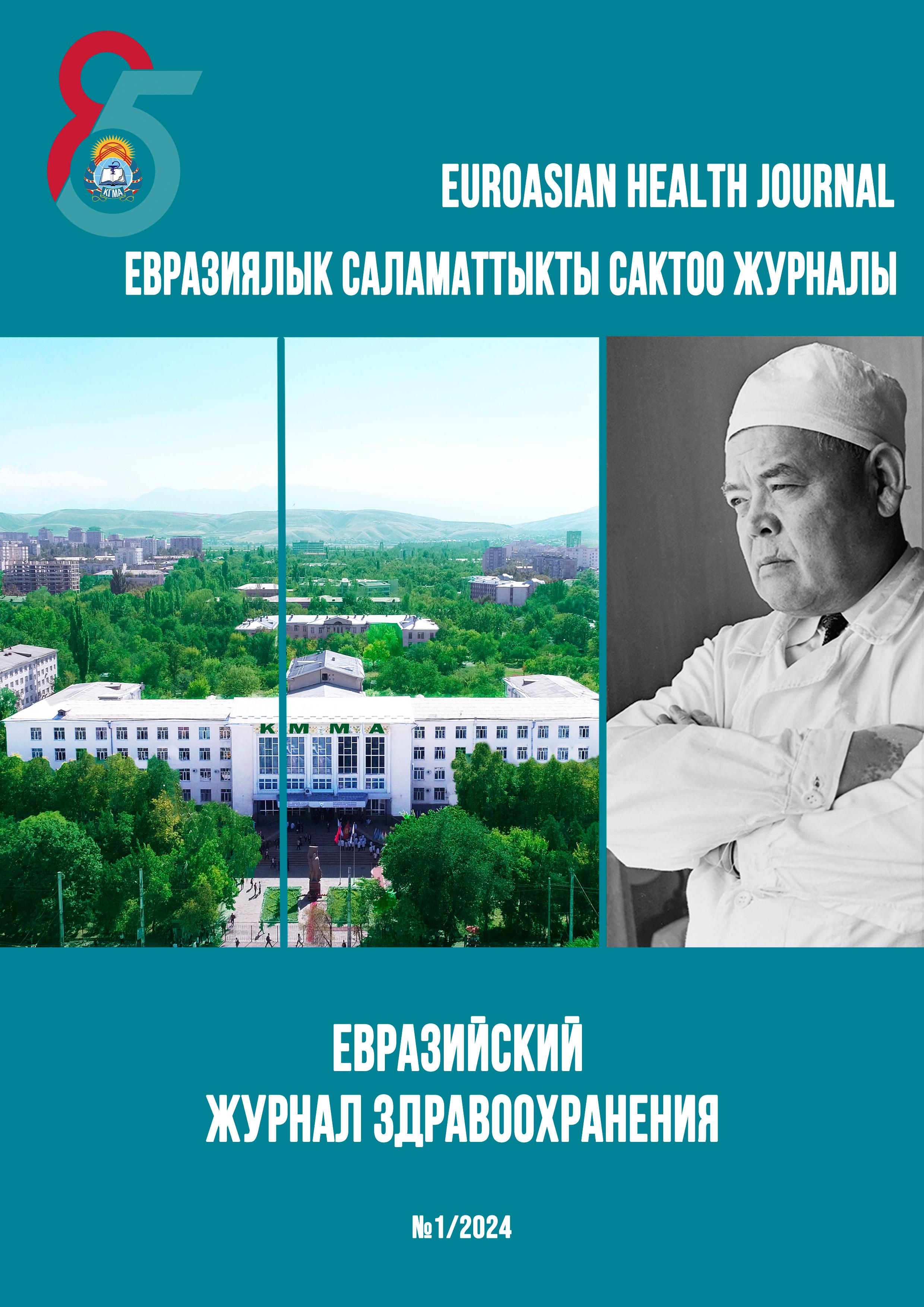GUIDED PROGRAMMED DRUG TREATMENT OF ACUTE DESTRUCTIVE PANCREATITIS
DOI:
https://doi.org/10.54890/EHJ-2024-1-22Abstract
Background. Acute destructive pancreatitis is a condition in which a complex mechanism of development occurs, including several stages. Complications resulting from inflammation in the pancreas can include pancreatic necrotizing infection, peritonitis, abscesses, and systemic inflammatory responses, which can lead to multiple organ failure and even death. Understanding this developmental mechanism highlights the importance of timely diagnosis and effective treatment to prevent severe complications and improve the prognosis for patients. Purpose of the study. The main goal was to find out whether a combination of drugs can improve outcomes in acute destructive pancreatitis. Materials and research methods: a program for the administration of drugs directly into the target organ by catheterization of the splenic artery has been developed. The results of the treatment of 144 patients with acute destructive pancreatitis who were admitted to the surgical department of the Astana City Multidisciplinary Hospital No. 2 in 2020-2023 were analyzed. The age of the patients is from 30 to 63 years. There was a predominance of the age group of the working age period from 41 to 63 years - (81.9%). There were 86 men (59.7%) and 58 women (40.3%). Study results. The absence of septic complications was noted in 42 out of 72 patients in the main group and in 36 out of 72 patients in the control group. Urgent surgical intervention was required in 7 out of 72 patients in the main group and in 24 out of 72 patients in the control group. The mortality rate was 4 out of 72 in the main group and 8 out of 72 in the control group. The average length of hospital stay was shorter in patients of the main group. Conclusion: the study showed that the combination of drugs chosen by us is more effective in preventing septic complications and reducing mortality in ADP than intravenous therapy.
Keywords:
acute destructive pancreatitis, selective cannulation of the splenic artery, programmed controlled administration of drugs, target organ.References
1. Petrov MS, Yadav D. Global epidemiology and holistic prevention of pancreatitis. Nat Rev Gastroenterol Hepatol. 2019;16(3):175-184. https://doi.org/10.1038/s41575-018-0087-5
2. Roberts SE, Morrison-Rees S, John A, Williams JG, Brown TH, Samuel DG. The incidence and aetiology of acute pancreatitis across Europe. Pancreatology. 2017;17(2):155-165. https://doi.org/10.1016/j.pan.2017.01.005
3. Boxhoorn L, Voermans RP, Bouwense SA, Bruno MJ, Verdonk RC, Boermeester MA, et al. Acute pancreatitis [published correction appears in Lancet. 2021 Nov 6;398(10312):1686]. Lancet. 2020;396(10252):726-734. https://doi.org/10.1016/ S0140-6736(20)31310-6
4. Zerem E, Kurtcehajic A, Kunosić S, Zerem Malkočević D, Zerem O. Current trends in acute pancreatitis: Diagnostic and therapeutic challenges. World J Gastroenterol. 2023;29(18):2747-2763. https://doi.org/10.3748/wjg.v29.i18.2747
5. Baron TH, DiMaio CJ, Wang AY, Morgan KA. American Gastroenterological Association Clinical Practice Update: Management of Pancreatic Necrosis. Gastroenterology. 2020;158(1):67-75.e1. https://doi.org/10.1053/j.gastro.2019.07.064
6. Zheng Z, Ding YX, Qu YX, Cao F, Li F. A narrative review of acute pancreatitis and its diagnosis, pathogenetic mechanism, and management. Ann Transl Med. 2021;9(1):69. https://doi.org/10.21037/atm-20-4802
7. Zerem E. Treatment of severe acute pancreatitis and its complications. World J Gastroenterol. 2014;20(38):13879-13892. https://doi.org/10.3748/wjg.v20.i38.13879
8. Working Group IAP/APA Acute Pancreatitis Guidelines. IAP/APA evidence-based guidelines for the management of acute pancreatitis. Pancreatology. 2013;13(4, Suppl 2):e1-e15. https://doi.org/10.1016/j.pan.2013.07.063
9. Vege SS, DiMagno MJ, Forsmark CE, Martel M, Barkun AN. Initial Medical Treatment of Acute Pancreatitis: American Gastroenterological Association Institute Technical Review. Gastroenterology. 2018;154(4):1103-1139. https://doi.org/10 .1053/j.gastro.2018.01.031
10. Trikudanathan G, Wolbrink DRJ, van Santvoort HC, Mallery S, Freeman M, Besselink MG. Current Concepts in Severe Acute and Necrotizing Pancreatitis: An Evidence-Based Approach. Gastroenterology. 2019;156(7):1994-2007.e3. https://doi.org/10.1053/j.gastro.2019.01.269
11. Zhou M, Chen B, Sun H, Chen X, Yu Z, Shi H, et al. The efficiency of continuous regional intra-arterial infusion in the treatment of infected pancreatic necrosis [published correction appears in Pancreatology. 2013 Nov-Dec;13(6):639]. Pancreatology. 2013;13(3):212-215. https://doi.org/10.1016/j.pan.2013.02.004
12. Bassi C, Falconi M, Caldiron E, Salvia R, Sartori N, Butturini G, et al. Assessment and Treatment of Severe Pancreatitis: Protease Inhibitor. Digestion. 1999;60(Suppl. 1):5–8. https://doi.org/10.1159/000051445
13 .Heinrich S, Schäfer M, Rousson V, Clavien PA. Evidence-based treatment of acute pancreatitis: a look at established paradigms. Ann Surg. 2006;243(2):154-168. https://doi.org/10.1097/01.sla.0000197334.58374.70
14. Seta T, Noguchi Y, Shimada T, Shikata S, Fukui T. Treatment of acute pancreatitis with protease inhibitors: a meta-analysis. Eur J Gastroenterol Hepatol. 2004;16(12):1287-1293. https://doi.org/10.1097/00042737-200412000-00009
15. Satoh H, Harada M, Tashiro S, Shiroya T, Imawaka H, Machii K. The effect of continuous arterial infusion of gabexate mesilate (FOY-007) on experimental acute pancreatitis. J Med Invest. 2004;51(3-4):186-193. https://doi.org/10.2152/ jmi.51.186
16. Hamada T, Yasunaga H, Nakai Y, Isayama H, Horiguchi H, Matsuda S, et al. Continuous regional arterial infusion for acute pancreatitis: a propensity score analysis using a nationwide administrative database. Crit Care. 2013;17(5):R214. https://doi.org/10.1186/cc13029
17. Mikami Y, Takeda K, Matsuda K, Qiu-Feng H, Fukuyama S, Egawa S, et al. Rat experimental model of continuous regional arterial infusion of protease inhibitor and its effects on severe acute pancreatitis. Pancreas. 2005;30(3):248-253. https://doi.org/10.1097/01.mpa.0000153328.54569.28
18. Takeda K, Matsuno S, Sunamura M, Kakugawa Y. Continuous regional arterial infusion of protease inhibitor and antibiotics in acute necrotizing pancreatitis. Am J Surg. 1996;17:394–398. https://doi.org/10.1016/S0002-9610(97)89617-1
19. Takeda K, Matsuno S, Ogawa M, Watanabe S, Atomi Y. Continuous regional arterial infusion (CRAI) therapy reduces the mortality rate of acute necrotizing pancreatitis: results of a cooperative survey in Japan. J Hepatobiliary Pancreat Surg. 2001;17:216–220. https://doi.org/10.1007/s005340170019
20. Imaizumi H, Kida M, Nishimaki H, Okuno J, Kataoka Y, Kida Y, et al. Efficacy of continuous regional arterial infusion of a protease inhibitor and antibiotic for severe acute pancreatitis in patients admitted to an intensive care unit. Pancreas. 2004;17:369–373. https://doi.org/10.1097/00006676-200405000-00003
21. Takeda K. Antiproteases in the treatment of acute necrotizing pancreatitis: continuous regional arterial infusion. JOP. 2007;8(4 Suppl):526-532.
22. Piaścik M, Rydzewska G, Milewski J, Olszewski S, Furmanek M, Walecki J, et al. The results of severe acute pancreatitis treatment with continuous regional arterial infusion of protease inhibitor and antibiotic: a randomized controlled study. Pancreas. 2010;39(6):863-867. https://doi.org/10.1097/MPA.0b013e3181d37239
23. Inoue K, Takano H. Urinary trypsin inhibitor as a therapeutic option for endotoxin-related inflammatory disorders. Expert Opin Invest Drugs. 2010;19:513–20. https://doi.org/10.1517/13543781003649533
24. Pan Y, Fang H, Lu F, Pan M, Chen F, Xiong P, et al. Ulinastatin ameliorates tissue damage of severe acute pancreatitis through modulating regulatory T cells. J Inflammation. 2017;14:7. https://doi.org/10.1186/s12950-017-0154-7
25. Linder A, Russell JA. An exciting candidate therapy for sepsis: ulinastatin, a urinary protease inhibitor. Intensive Care Med. 2014;40:1164–7. https://doi.org/10.1007/s00134-014-3366-9
26. Song D, Song G, Niu Y, Song W, Wang J, Yu L, et al. Ulinastatin activates haem oxygenase 1 antioxidant pathway and attenuates allergic inflammation. Br J Pharmacol. 2014;171:4399–412. https://doi.org/10.1111/bph.12780
27. Li ST, Dai Q, Zhang SX, Liu YJ, Yu QQ, Tan F, et al. Ulinastatin attenuates LPS-induced inflammation in mouse macrophage RAW264.7 cells by inhibiting the JNK/NF-κB signaling pathway and activating the PI3K/Akt/Nrf2 pathway. Acta Pharmacol Sin. 2018;39(8):1294-1304. https://doi.org/10.1038/aps.2017.143
28. Wang J, Jin J, Huang J, Li DR, Hao Y, Kong JD, et al. [Clinical value of the early use of ulinastatin in patients with moderately severe or severe acute pancreatitis]. Zhonghua Yi Xue Za Zhi. 2017;97(16):1252-1255. https://doi.org/.3760/ cma.j.issn.0376-2491.2017.16.015
29. Inoue K, Hirota M, Beppu T, Ishiko T, Kimura Y, Maeda K, et al. Angiographic features in acute pancreatitis: the severity of abdominal vessel ischemic change reflects the severity of acute pancreatitis. JOP. 2003;4(6):207-213.
30. Ибраимов Д.С., Эсенбаев Ж.Ж., Жусуп уулу У. Программированное лечение больных с острым панкреатитом. Вестник КГМА им. И.К. Ахунбаева. 2022;3:18-24. [Ibraimov D.S., Esenbaev Zh.Zh., Zhusup uulu U. Programmed management of patients with acute pancreatitis. Vestnik KSMA n.a. I.K. Akhunbaev. 2022;3:18-24. 24. (In Russ.)]. https://doi.org/10.54890/1694-6405_2022_3_18
31. Hamada T, Yasunaga H, Nakai Y, Isayama H, Horiguchi H, Matsuda S, et al. Continuous regional arterial infusion for acute pancreatitis: a propensity score analysis using a nationwide administrative database. Crit Care. 2013;17(5):R214. https://doi.org/10.1186/cc13029







